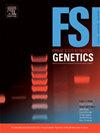Heating up three cold cases in Norway using investigative genetic genealogy
IF 3.1
2区 医学
Q2 GENETICS & HEREDITY
引用次数: 0
Abstract
With the advent of commercial DNA databases, investigative genetic genealogy (IGG) has emerged as a powerful forensic tool, rivalling the impact of STR analyses, introduced four decades ago. IGG has been frequently applied in the US and tested in other countries, but never in Norway. Here, we apply IGG to three cold criminal cases and successfully identify the donor of the DNA in two of these cases. Our findings suggest that when combined with phenotypic prediction and case information, IGG holds substantial potential for resolving both active and cold cases in Norway. This potential is amplified by the digitalization of archives and the transparent and structured nature of society in Norway. Additionally, the databases exhibit sufficient representation to yield matches with distant relatives. Moreover, this work has uncovered a series of lingering research questions spanning the entire workflow from DNA extraction to genealogy research. Finally, we highlight the possibility that more insights can be gleaned from genetic profiles, for instance using an accurate age prediction method. The results show that IGG can be successfully applied in Norway, having reached a level of maturity that enables identification of unknown individuals in cases where DNA is accessible.
利用基因系谱研究挪威的三起悬案。
随着商业DNA数据库的出现,调查基因谱系(IGG)已经成为一种强大的法医工具,与40年前引入的STR分析的影响相媲美。IGG经常在美国应用,在其他国家进行检测,但从未在挪威进行过。在这里,我们将IGG应用于三个悬案,并成功地确定了其中两个案件的DNA供体。我们的研究结果表明,当与表型预测和病例信息相结合时,IGG在解决挪威的活跃病例和感冒病例方面具有巨大的潜力。档案的数字化以及挪威社会的透明和结构化,放大了这一潜力。此外,数据库表现出足够的代表性,以产生与远亲的匹配。此外,这项工作还揭示了一系列挥之不去的研究问题,涵盖了从DNA提取到家谱研究的整个工作流程。最后,我们强调了从基因图谱中收集更多信息的可能性,例如使用准确的年龄预测方法。结果表明,IGG可以在挪威成功应用,已经达到成熟的水平,可以在DNA可获得的情况下识别未知个体。
本文章由计算机程序翻译,如有差异,请以英文原文为准。
求助全文
约1分钟内获得全文
求助全文
来源期刊
CiteScore
7.50
自引率
32.30%
发文量
132
审稿时长
11.3 weeks
期刊介绍:
Forensic Science International: Genetics is the premier journal in the field of Forensic Genetics. This branch of Forensic Science can be defined as the application of genetics to human and non-human material (in the sense of a science with the purpose of studying inherited characteristics for the analysis of inter- and intra-specific variations in populations) for the resolution of legal conflicts.
The scope of the journal includes:
Forensic applications of human polymorphism.
Testing of paternity and other family relationships, immigration cases, typing of biological stains and tissues from criminal casework, identification of human remains by DNA testing methodologies.
Description of human polymorphisms of forensic interest, with special interest in DNA polymorphisms.
Autosomal DNA polymorphisms, mini- and microsatellites (or short tandem repeats, STRs), single nucleotide polymorphisms (SNPs), X and Y chromosome polymorphisms, mtDNA polymorphisms, and any other type of DNA variation with potential forensic applications.
Non-human DNA polymorphisms for crime scene investigation.
Population genetics of human polymorphisms of forensic interest.
Population data, especially from DNA polymorphisms of interest for the solution of forensic problems.
DNA typing methodologies and strategies.
Biostatistical methods in forensic genetics.
Evaluation of DNA evidence in forensic problems (such as paternity or immigration cases, criminal casework, identification), classical and new statistical approaches.
Standards in forensic genetics.
Recommendations of regulatory bodies concerning methods, markers, interpretation or strategies or proposals for procedural or technical standards.
Quality control.
Quality control and quality assurance strategies, proficiency testing for DNA typing methodologies.
Criminal DNA databases.
Technical, legal and statistical issues.
General ethical and legal issues related to forensic genetics.

 求助内容:
求助内容: 应助结果提醒方式:
应助结果提醒方式:


